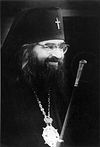

| Previous day | Next day |
| Old Style
June 19
|
Monday |
New Style
July 2
|
|
6th Week after Pentecost.
Tone 4.
Fast of the Holy Apostles. |
Fish, wine and oil allowed.
|
![]() Holy Apostle Jude, the Brother of the Lord (ca. 80).
Holy Apostle Jude, the Brother of the Lord (ca. 80). ![]() St. Job, patriarch of Moscow (1607).
St. Job, patriarch of Moscow (1607). ![]() St. John (Maximovitch), archbishop of Shanghai and San Francisco (1966).
St. John (Maximovitch), archbishop of Shanghai and San Francisco (1966).
Martyr Zosimas the Soldier, at Antioch in Pisidia (ca. 89-117). St. Paisius the Great, of Egypt (5th c.). St. John the Solitary, of Jerusalem (6th c.). St. Barlaam, monk of Shenkursk (1462). St. Paisius the Bulgarian, of Hilandar, Mt. Athos (18th c.).
Holy Myrrh-bearer Mary, mother of Apostle James (1st c.). St. Macarius of Petra (4th c.). St. Zeno, hermit, of Egypt (4th c.). St. Romuald, abbot of Camaldoli (Ravenna) (1027). Hieromartyr Asyncretus.
Repose of Schemamonk Theoktist, desert-dweller, of Valaam (1863) and Archbishop Leonty of Chile (1971).
Thoughts for Each Day of the Year
According to the Daily Church Readings from the Word of God
By St. Theophan the Recluse

Monday. [Rom. 16:17-24; Matt. 13:10-23]
Why do many people not understand discussions about spiritual things? It is due to a thickening of their heart. When their heart is full of attachments to earthly things, it grows coarse, as is said, he grew fat, he grew thick, he waxed broad [Deut. 32:15]. In this state it gravitates downward like a heavy-weight, dragging and chaining the entire soul to the ground, together with the mind. Then, always churning in its circle of low objects, it becomes low in its thought and cannot soar up on high, like a bird weighed down with food. Churning there, it does not see the heavenly, and its entire disposition is against it… Heaven is an alien country to these people. Such a person has nothing within the sum total of his understanding and experience to which he could relate the heavenly, that he might be able to see it if only through a glass darkly [cf. Cor. 13:12]. That is why he won’t try to discuss it, nor does he wish to listen to others discussing it, and he won’t pick up any books written about it. Isn’t this why you’ll often find any number of secular magazines in people’s homes, but not a single spiritual periodical or book—not even the Gospels?
Articles
 Opening of the Relics, and Glorification of St. John MaximovitchArchpriest Peter Perekrestov"He is incorrupt! His relics are incorrupt!" |
 Martyr Zosimus the Soldier at Antioch, in PisidiaThe Martyr Zosimus lived in the city of Apollona (Thrace) during the reign of Trajan (89-117), the persecutor of Christians. |
 St John the Solitary of JerusalemSaint John the Hermit was an ascetic in Palestine. He passed his days in fasting and prayer in a cave near Jerusalem. |















